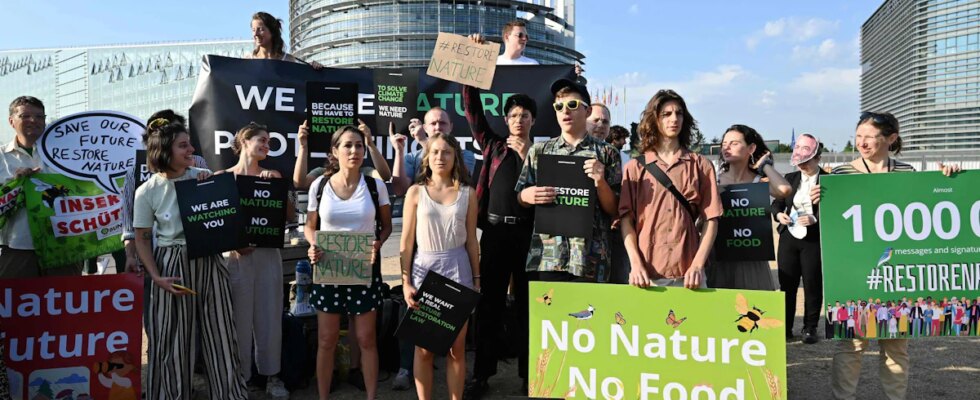The European Green Deal, the major climate and environmental program of EU Commission President Ursula von der Leyen, recently seemed to be politically dead – but now it is unexpectedly showing signs of life again: after months of wrangling, the law on “restoring nature” found the necessary majority in the EU Environment Council on Monday morning. It is considered the most important European nature conservation law in decades. The EU wants to introduce renaturation measures on at least 20 percent of the damaged land and sea areas by 2030. Forests will be reforested, moorlands rewetted, and rivers will be allowed to run their natural course again.
The decisive factor was a solo effort by Austrian Environment Minister Leonore Gewessler. At the meeting in Luxembourg, the Green Party voted for the law against the will of Chancellor Karl Nehammer (ÖVP). To prevent the vote, Nehammer wrote a letter on Sunday to Belgian Prime Minister Alexander De Croo, whose government holds the Council Presidency and thus oversees the EU’s agenda: Gewessler was not acting on behalf of the Austrian government. But the Belgian government came to the conclusion that only the vote of the responsible minister counted. The lawsuit against it before the European Court of Justice (ECJ) announced by Nehammer had no chance.
Most recently, the Belgian and Dutch governments changed their stance
The issue of renaturation was part of the Brussels struggle over the Green Deal for a long time. The European People’s Party (EPP), led by CSU politician Manfred Weber, opposed several nature conservation laws presented by the Commission in the European Parliament that were linked to conditions for agriculture. A law to limit the use of pesticides failed in Parliament, but the renaturation law found a narrow majority there. Several EPP members also voted for it after it had been watered down in the final negotiations (trilogue) with the Commission and the member states.
In the compromise, the EU states also accommodated the interests of agriculture. Where previously obligations were stipulated, in many cases voluntary agreements are now being discussed. The law does not formulate any goals for renaturation, only measures. The aim is to prevent governments from being sued by nature conservation associations. An “emergency brake” was also agreed in the event that food becomes scarce and additional cultivation areas are therefore needed. Nevertheless, the German Farmers’ Association announced that it continues to reject the law and criticizes the agreement “in the strongest possible terms.”
The German traffic light government also signalled its approval after the trialogue, and the final vote among the member states seemed to be a mere formality. But then, with an eye on the European elections, some governments backed out, for example the Belgian and Dutch ones. The required qualified majority – at least 55 percent of governments must agree and represent at least 65 percent of the EU population – was out of reach. The law disappeared from the agenda. Now it has resurfaced, thanks to Minister Gewessler, who is prepared to risk a coalition crisis on behalf of the Greens.
The EU Commissioner for the Environment, Virginijus Sinkevičius from Lithuania, pointed out in Luxembourg how important the Renaturation Act is for the EU. Confidence in the EU’s legislative process will be lost if texts that have already been agreed are overturned. And the EU will lose credibility as a driver of environmental and climate protection. Sinkevičius led the EU delegation at the World Nature Summit in Montreal at the end of 2022. The Renaturation Act is the EU’s means of complying with the biodiversity agreement agreed in Montreal. It states, for example, that repair measures should begin on 30 percent of damaged areas worldwide by 2030.
The Greens see themselves as a protective power for the Green Deal in Brussels
The German Environment Minister Steffi Lemke of the Greens appeared relieved in Luxembourg. After the law had been “caught in the mill of the election campaign”, the EU is now showing how important the protection of the environment and nature is to it. Lemke mentioned the importance of renaturation in flood protection, but also for agriculture, which depends on the preservation of biodiversity. When asked whether this vote was a model for future “progressive majorities” in the EU, she replied that conservative governments had also voted for the law.
The Greens see themselves in Brussels as a protective force for the Green Deal that Ursula von der Leyen launched in 2019. Whether they will become part of the parliamentary majority that supports von der Leyen’s second term in office will become clear in the negotiations over the next few weeks.

